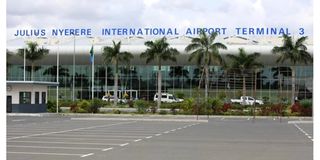Parliament approves bill granting full autonomy to Tanzania’s airports authority

What you need to know:
- The enacted law therefore aims to establish a robust and stable legal framework for the management, operations, and development of airports in Tanzania.
Dar es Salaam. The Parliament passed a bill of law yesterday to make the Tanzania Airports Authority (TAA) a fully-fledged institution to enhance its efficiency and the performance of the aviation industry in the country.
The decision was reached due to the TAA’s failure to operate with independence after being established through Government Notice No. 404 of 1999.
Reports say TAA has been operating as an agency under the Government Agencies Act, Chapter 245, under the oversight of an advisory board with limited powers.
The enacted law therefore aims to establish a robust and stable legal framework for the management, operations, and development of airports in Tanzania.
The law also aims to address challenges in the management, development, and operations of airports faced by TAA in fulfilling its responsibilities.
Tabling the bill in Parliament yesterday, Transport minister Prof Makame Mbarawa said the document proposed a section of the law to establish a register to preserve airport records, formulate different committees for execution and enable airport operations.
“Furthermore, the bill establishes provisions that enable TAA to set fees for various airport services, as well as the authority to monitor restricted areas around airports by conducting surveillance and inspections in areas adjacent to the airports,” said Prof Mbarawa.
He said the document also outlines issues related to the quality of provided services, security concerns, aircraft parking management and removal of aircraft, vehicles and equipment.
Others are removal of damaged equipment from the runways, handling and storage of hazardous goods, responding to airport emergencies, and selection of locations for airport construction.
Planning, design and construction of airports; maintenance of airports; as well as the management of land, infrastructure, and properties at airports were the other highlighted issues.
“The proposed provisions aim at ensuring the government-owned airports are managed and operated according to established regulatory standards,” he said.
Furthermore, Prof Mbarawa said the bill also included provisions establishing the TAA sources of funds and procedures for auditing the authority’s accounts.
“These sources include funds allocated by Parliament and fees imposed for various airport services.
The bill also specifies provisions related to the investment of TAA funds, the budget approval process, and the submission of annual activity reports,” he said, noting that the law aims at enhancing transparency and accountability in financial matters.
According to him, the bill has outlined various offences and penalties for individuals found guilty of stipulated offences, including possessing dangerous items such as guns and explosives in controlled or prohibited areas and engaging in actions that could jeopardise security and safety at airports.
He named other offences as damaging airport infrastructure, obstructing or hindering TAA employees from performing their legal duties, and interfering with the proper use of airports focused on ensuring compliance with the various requirements of the proposed law.
Submitting recommendations, the parliamentary infrastructure committee chairman, Mr Selemani Kakoso, said the Ministry of Transport, the Ministry of Finance, and the Attorney General’s Office should jointly conduct a feasibility study on the best procedures for collecting, retaining, and allowing the TAA to utilise the Passenger Services Charge in full.
“They have been advised to establish legal provisions that will now enable the TAA to use the revenue from this charge more freely and efficiently,” he said.
Mr Kakoso said the committee has advised the Ministry of Transport, the Ministry of Home Affairs, the Ministry of Defence and National Service, the Attorney General, and any other relevant authorities to conduct an in-depth study to determine the best legal methods for enabling the TAA to have an Airport Firefighting Brigade and Rescue Service to meet international standards.
“The TAA should prepare proposals for establishing an airport firefighting brigade and rescue service and how it will be integrated into the authority’s structure to enhance efficiency,” he said.




